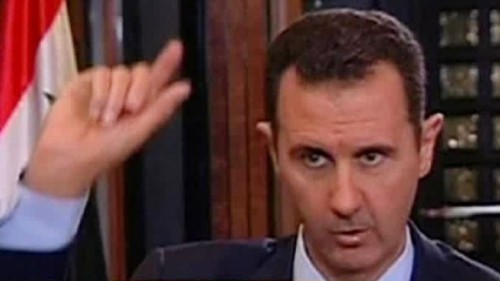 Syrian President Bashar Al Assad said Wednesday that setbacks are a normal part of any war and do not mean the conflict is lost, in his first comments after several regime defeats.
Syrian President Bashar Al Assad said Wednesday that setbacks are a normal part of any war and do not mean the conflict is lost, in his first comments after several regime defeats.
“Today we are fighting a war, not a battle. War is not one battle, but a series of many battles,” he said during a rare public appearance on Syria’s Martyrs Day.
“We are not talking about tens or hundreds but thousands of battles and … it is the nature of battles for there to be advances and retreats, victories and losses, ups and downs.”
“Psychological defeat is the final defeat and we are not worried,” he said.
He said troops would head to an insurgent-held town to help besieged soldiers holed up on its outskirts and said army setbacks were part of normal warfare.
Last month Islamist insurgents including Al Qaida’s wing in Syria, Al Nusra Front, captured the town of Jisr Al Shughour in Syria’s Idlib province, edging closer to the government-held heartland of Latakia along the coast.
“And now, God willing, the army will arrive soon to these heroes who are besieged in the Jisr Al Shughour Hospital to continue the battle to defeat the terrorists,” he said in comment broadcast on Syrian state television.
In the rare public appearance, he was surrounded by throngs of people chanting in support. Security officials held back surging crowds.
Meanwhile, the United Nations has adopted a cautious approach to the Syria talks it launched this week, avoiding raising expectations that this latest initiative can end a four-year-old conflict which has so far defied all diplomatic efforts to resolve it.
UN Syria envoy Staffan de Mistura says he wants to talk to diplomats, activists and political and military leaders to see if there is any new common ground since a roadmap for ending the war was declared in 2012.
Diplomats are sceptical his efforts will come to anything, but agree this year alone much has changed, both on the battlefield and in the relationships between allies and opponents of Al Assad.
“The balance of power has shifted,” said one Western diplomat who tracks Syria. “The government sees that they have lost some battles but not the war. But it could still be the beginning of the end, everything is possible.” On the battlefield Al Nusra Front has made significant gains in recent weeks in the northwestern province of Idlib, edging closer to the government-held heartland of Latakia.
In the southwest rebels have captured a crossing with Jordan, suggesting new resolve by Arab backers who want Al Assad to step down. But diplomats say Al Assad’s inner circle remains strong after government defections earlier in the uprising and main allies Iran and Russia are steadfast.
Hardliners including Daesh have advanced at the expense of more mainstream rebels since the last round of Geneva talks in February 2014. US-led forces have been striking the group in Iraq and in Syria since the summer.
De Mistura, whose two predecessors resigned in frustration at the failure to make headway, has already had to drop his first initiative – a proposed freeze to hostilities in the city of Aleppo which he hoped could expand into a wider truce.
He is not calling his consultations “peace talks” or “Geneva 3”, a name that suggests a third attempt at a UN-brokered truce. But some diplomats think that is what his separate, one-on-one discussions are designed to lead into.
Participants invited include the Syrian government, a myriad of opposition groups and non-jihadist armed factions, civil society members, non-governmental organizations, representatives of five major world powers, Iran, bordering countries as well as Qatar and Saudi Arabia.
GN

Leave a Reply
You must be logged in to post a comment.